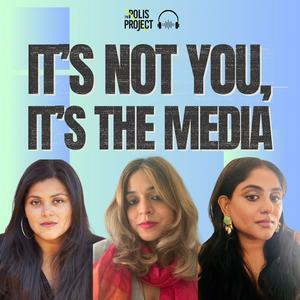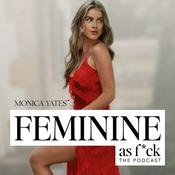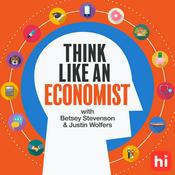26 episodes

Why Celebrity Algorithms are Destroying You
2025/5/25 | 39 mins.
The hosts take a critical look at the algorithms ruling our lives on social media and beyond, with a warning to divest from celebrity content and culture that permeates the news cycle, politics, and more. Whereas the early Facebook and Instagram eras were known for curated and bespoke feeds that were personally made for you, social media has largely become a commercialized landscape with scarily targeted ads and influencers promoting the next big thing in makeup, skincare, clothing, and more.These algorithms have an outsized influence on politics too, and the hosts discuss the ways social and political movements drove engagement on social media – from the Arab Spring in the early 2010s to the movement for Palestine now. Even as communities on the margins seek to take advantage of the more “democratized” social media platforms, the companies that are so invested in keeping you scrolling relentlessly push celebrity and influencer content, no matter how much or little you engage with them. The hosts outline the algorithmic, commercial, and celebrity culture logics coming together at this moment, where you might want to share and find news about Palestine, but will be recommended reel after reel of Bollywood stars instead. We remain bystanders in an ongoing genocide, but are continuously fed celebrity content and forced to care about the intimate details of the lives of celebrities and influencers online. These algorithms are destructive, as they seek to distract and keep us complacent. The hosts call on our listeners to resist the algorithm and its seemingly all-encompassing control over our lives, so that we can reclaim power in the digital and physical information landscape.Key Takeaways:Social media algorithms have evolved from bespoke curated feeds to commercialized targeting, with specific ads geared towards us based on seconds-long interactions with postsThis algorithmic logic influences how news is circulated and consumed too – outlets like Buzzfeed that function primarily as news aggregators take advantage of celebrity culture to keep social media users engagedCelebrity culture has captured every sphere of our lives – going so far as to have celebrity endorsements and statements become key influences in election cyclesThe algorithm and social media companies benefit from the constant stream of intimate details of every celebrity scandal and personality that has destroyed our attention spans.Political content is constantly suppressed in favor of ever more ridiculous and polarizing posts and scandals, as is demonstrated by the shadow-banning of accounts posting about Palestine in the ongoing genocide.Keywords: celebrity culture, celebrity algorithms, algorithmic logics, influencers, social media, Facebook, Instagram, TikTok, Palestine, reels, For You page, curation, Gaza, genocide

The Screen, the Stadium & the State: Bollywood Comes out to Play
2025/5/05 | 31 mins.
The hosts take a sharp, playful, and unflinching look at Bollywood’s obsession with sports films and the not-so-subtle nationalism embedded within them. From Lagaan to Chak De! India to 83, they explore why India’s sports biopic industry has exploded in the past 15 years, and how these films turn real-life athletic struggles into patriotic spectacles. What makes a sports movie so irresistible? Why does every underdog story end in a tear-jerking celebration of the nation? And how does Bollywood sanitize the harsh realities of caste, gender, and systemic neglect in Indian sports, replacing them with glossy, emotionally manipulative narratives?The conversation moves from Lagaan’s colonial cricket fantasy to 83’s oddly racialized portrayal of the West Indies team. They examine how India’s sporting heroes — from Milkha Singh to Mary Kom — are repackaged for mass consumption, often stripping away the uncomfortable truths about their struggles. What does it mean when films like Dangal make a father the protagonist of his daughters’ success, or when Mary Kom erases the racism Northeastern athletes face? And why does every sports film, no matter how critical it starts out, inevitably circle back to a simplistic celebration of Indian exceptionalism?This episode also interrogates the way Bollywood builds masculinity through sports films, the influence of the influencer economy on how we view discipline and success, and how these movies manufacture nostalgia for a version of India that never really existed.Key takeawaysSports films thrive on feel-good nationalism. No matter how much struggle is depicted, the final message is always about national pride, often at the expense of addressing real inequalities.Underdog stories individualize struggle rather than critiquing systems. Instead of exposing the larger caste, class, and gender barriers in Indian sports, these films narrow the conflict down to a single corrupt official or a personal redemption arc.Women’s sports are shown through a male lens. Whether it’s Chak De! India centering Shah Rukh Khan over the women’s hockey team or Dangal framing the Phogat sisters’ success as their father’s victory, the female athlete is rarely the true protagonist.Bollywood repackages the “good Muslim” trope. Whether it’s Chak De! India or Dangal, Muslim characters are carefully written to be hyper-loyal and non-threatening, reinforcing an idea of “acceptable” patriotism.The nation gets credit for individual sacrifice. Films celebrate the perseverance of Indian athletes, but the moment they succeed, their personal triumph is absorbed into a larger nationalist narrative.Bollywood’s nostalgia machine is relentless. If modern India can’t be romanticized, these films turn to past sporting glories — like 83 and Gold — to construct a sentimental vision of unity and victory.KeywordsBollywood, sports movies, nationalism in film, underdog narratives, caste in sports, cricket, Lagaan, 83, Chak De! India, Dangal, Mary Kom, masculinity in cinema, patriotic storytelling, Indian identity, Akshay Kumar, nostalgia politics, media and state propaganda.A podcast by The Polis Projectwww.thepolisproject.com

Indian Cinema and Censorship: Featuring Anna M.M. Vetticad
2025/4/23 | 43 mins.
The hosts are joined by award-winning film critic and journalist Anna M.M. Vetticad for a conversation on the state of Indian cinema under Modi-era censorship. A veteran of over 30 years in journalism, Anna brings her incisive political analysis and deep knowledge of film culture to this episode — exposing how India’s cinematic landscape has become a battleground for ideology, identity, and power.The episode opens by locating cinema as a contested space — one long understood by right-wing regimes as a site of influence. Cinema’s ability to shape narratives and rewrite memory has been crucial to the rise of fascist aesthetics in India. Anna unpacks this, walking us through the seismic shifts she’s witnessed as the Hindi film industry folds itself into a willing arm of propaganda — while regional cinemas like Tamil and Malayalam push back, albeit within their own deeply patriarchal structures.Together, the hosts and Anna break down the difference between old and new censorship — no longer confined to the formal mechanisms of the CBFC, but a sprawling ecosystem of soft coercion, self-censorship, ideological appeasement, and weaponised “hurt sentiments.” Anna explains how even innocuous details — like a character eating chicken or bearing a Hindu name — are now seen as political provocations. The conversation draws from Anna’s landmark Article 14 investigation, revealing the growing climate of fear, complicity, and ideological capture among India’s most powerful cultural producers.But the rot isn’t just institutional — it’s also representational. The group traces the casteist and communal undercurrents of blockbuster films like RRR and Kesari, the masculine saviour complex glorified in pan-India hits, and the soft erasure of minority identities in so-called secular classics like Veer-Zaara. Anna also sharply critiques the toxic misogyny embedded within South Indian industries, questioning how progressive a cinema can be when it remains tethered to structures of hero worship and patriarchal dominance.Even amid this, there are flickers of resistance. Anna urges us to remember the stakes — and the power — of storytelling. Anna leaves us with a cautious optimism: that pushing too hard might spark a reckoning, that even in the face of repression, stories will find their way through.KeywordsIndia, cinema, censorship, Modi, soft power, propaganda, Hindutva, self-censorship, Veer-Zaara, Kesari, RRR, Article 14, misogyny, South India, secularism, interfaith romance, fascist aesthetics, narrative, resistance.Read some of Anna’s work here:How A Modi-Era Ecosystem Of Official & Unofficial Censorship Is Transforming India’s Film Industries, Article 14, https://article-14.com/post/how-a-modi-era-ecosystem-of-official-unofficial-censorship-is-transforming-india-s-film-industries-679fdbcd6f914Hindi cinema’s lone rangers: Dissent in a sea of propaganda films, The News Minute, https://www.thenewsminute.com/news/hindi-cinemas-lone-rangers-dissent-in-a-sea-of-propaganda-filmsTrial by Cinema, Supreme Court Observer, https://www.scobserver.in/75-years-of-sc/trial-by-cinema-films/A Wake-up Call for All Indian Film Industries, The Quint,

Visa and Border Regimes: Featuring Tanvi Misra
2025/4/10 | 48 mins.
As the crackdown on immigration and violent deportations explode across the US, Suchitra, Bhakti, and Madhuri are joined by journalist Tanvi Misra to peel back the bureaucratic spectacle of American border regimes. The conversation takes a deeper look at how legal status — once seen as a form of protection — is increasingly weaponised by the state to police dissent, particularly among immigrants and students engaged in pro-Palestinian activism. Green card holders and international students, once thought to be “safe” under the law, are now facing ideological screening, detention, and deportation — revealing how even legal status offers no true safeguard in a system built to punish and control.Tanvi draws from years of investigative reporting to expose how visa systems, detention infrastructures, and digital surveillance are being leveraged not only to exclude and deport, but to criminalise entire identities. The episode interrogates the binary between legal and illegal status that is not only porous but deliberately engineered to collapse when politically expedient. Whether it’s AI-generated accusations, ICE raids in academic spaces, or the targeted revocation of green cards, what emerges is a state apparatus built on opacity, fear, and unchecked discretion.Private prison corporations and county jails profit from detention quotas, with a direct correlation between the presence of detention facilities and anti-immigrant legislation. The hosts explore the staggering level of discretion granted to individual ICE agents and border officers — discretion that enables arbitrary and biased enforcement, from SEVIS account purges to on-the-spot visa revocations. The hosts and Tanvi explore how this ecosystem is maintained — through corporate profiteering, media complicity, and a public desensitised by a carousel of dehumanising images. At the heart of it is a chilling question: when even legal status is no protection, what remains of the social contract?Tanvi Misra a writer and journalist covering immigration, criminal justice, and urban policy. Her work has appeared in The Nation, The Atlantic, The New Republic, and more. She was a 2022 Ira A. Lipman Fellow at Columbia University. She received the Pulitzer Center’s Global Reporting Grant in 2023. https://www.tanvimisra.com/Links to Tanvi Misra’s articlesNo Children Here, The Baffler, https://thebaffler.com/salvos/no-children-here-misraThe Pipeline Funneling US Deportees to Haitian Prison, The Nation, https://www.thenation.com/article/society/deportation-haiti-prison-conditions/The children of tech’s guest workers are pushing for immigration relief, The Verge, https://www.theverge.com/22585007/h1b-dependent-visa-age-out-documented-dreamers-immigration-reform‘I Became a Jailer’: The Origins of American Immigrant Detention, Bloomberg, https://www.bloomberg.com/news/features/2021-07-20/the-origins-of-american-immigration-detentionBroader Crises, The Baffler, https://thebaffler.com/latest/broader-crises-misraThe Ugly Bipartisan Obsession with the “Right” Number of Immigrants,...

If Op-Eds Could Kill
2025/4/03 | 33 mins.
The hosts turn their lens on the insidious, galvanizing power of the opinion column. The hosts dissect how elite liberal media platforms like The New York Times, The Washington Post, The Atlantic, and The Wall Street Journal have weaponized their op-ed pages to manufacture consent, launder imperialist narratives, and maintain the myth of expert credibility.The episode charts how op-ed writers and columnists such as Thomas Friedman, Nicholas Kristof, Maureen Dowd, and Paul Krugman have not only shaped public perspectives on issues but have actively steered foreign policy — often disastrously — through deeply polemical and emotionally manipulative writing. The hosts spotlight how newspapers use these columns as smokescreens, publishing “respectable” pieces by establishment figures while relegating critical or anti-imperialist perspectives to the realm of “guest opinions,” stripped of journalistic weight.They also dive into the complicity of non-white writers like Sadanand Dhume and Tunku Varadarajan, whose op-eds in economic and financial outlets weaponize histories of trauma to justify genocidal rhetoric, as in Dhume’s piece asking why Palestinians can’t just be “relocated” like Indians and Pakistanis were during the Partition. The hosts ask: why are these men handed megaphones and deemed a “credible” voice?From Hillary Clinton’s recent smug opinion on the Signal leaks to the op-ed that told poor Americans to skip breakfast, the episode lays bare the contempt these media giants have for the public they pretend to inform. The trio also revisit the coverage of Afghanistan, the Iraq War build-up, Gaza today, and the selective use of the word “genocide”. The episode ends on a sobering note: the war is not just “over there.” State repression, censorship, and violence against protesters in the US are proof — the war has come home.Key TakeawaysOp-eds can sway readers on big issues, manufacture consent, frame acceptable narratives, and create the illusion of balance while entrenching imperialist, elitist agendas.Liberal media launders its image by selectively platforming marginalised voices in the opinion section — never the news desk — framing truth as just “another perspective.”Figures like Thomas Friedman and Nicholas Kristof have consistently failed upward, steering disastrous foreign policy while being proven wrong repeatedly — and are still being treated as experts.Opinion columns from non-white writers can be used to give genocidal narratives a multicultural gloss, legitimizing apartheid and war crimes.KeywordsOpinion, journalism, New York Times, liberal hypocrisy, Thomas Friedman, Nicholas Kristof, Maureen Dowd, Sadanand Dhume, Tunku Varadarajan, op-eds and war, Palestine, Gaza genocide, American imperialism, gaslighting, Hillary Clinton, Wall Street Journal, expertise, censorship, NYT guest opinion, disinformation in media.A podcast by The Polis Project www.thepolisproject.com
More Education podcasts
Trending Education podcasts
About It's Not You, It's The Media
Listen to It's Not You, It's The Media, Trying Not to Care and many other podcasts from around the world with the radio.net app

Get the free radio.net app
- Stations and podcasts to bookmark
- Stream via Wi-Fi or Bluetooth
- Supports Carplay & Android Auto
- Many other app features
Get the free radio.net app
- Stations and podcasts to bookmark
- Stream via Wi-Fi or Bluetooth
- Supports Carplay & Android Auto
- Many other app features


It's Not You, It's The Media
download the app,
start listening.





































